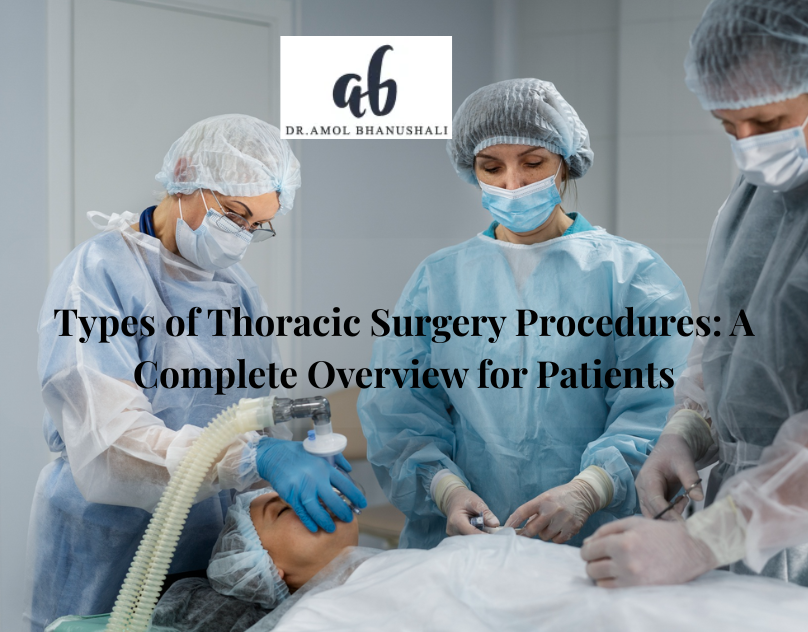Thoracic surgery is concerned with those medical conditions that relate to the chest cavity, such as the lungs, esophagus, pleura, diaphragm, chest wall, and mediastinum. With the modern advancements, these procedures have become easier and less intrusive, resulting in patients having faster recovery and outcomes.
Introduction to Thoracic Surgery
Thoracic surgery is diversified and consists of operations aimed at treating benign and malignant diseases. Key organs involved include:
- Lungs
- Esophagus
- Trachea and bronchial tubes
- Chest wall
- Diaphragm
- Mediastinum- is the space between the lungs and the heart, vessels, etc.
The methods of treatment are open surgery, minimally invasive procedures, and robotic-assisted ones. The leading hospitals use the latest tools, including VATS (Video-Assisted Thoracoscopic Surgery) and robotic systems, to ensure high precision.
Most Critical Thoracic Surgery Procedures
Some of the most important thoracic surgery procedures are given below:-
Lung Surgery
- Lobectomy: Lung cancer, severe infection, or local trauma often causes the removal of a lobe of the lung.
- Pneumonectomy: Total lung resection may be necessary in the case of a large cancer or chronic infection.
- Wedge Resection or Segmentectomy: A small part of the lung is removed, which is appropriate for small tumors or lesions.
- Bullectomy: Removes big air-filled pockets (bullae) in such conditions as emphysema and enhances breathing.
Pleural Surgery
- Pleurodesis: Treated in case of recurring pleural effusion (fluid in the lungs) or pneumothorax (collapsed lung) -it seals layers of the pleura, so that future issues do not occur.
- Pleurectomy/Decortication: Excision of all or a portion of the pleura to cure some cancers (e.g., mesothelioma), or infections ( e.g., empyema).
Esophageal Surgery
- Esophagectomy: The esophagus is partly or wholly removed, primarily as a treatment for cancer or gross destruction.
- Heller myotomy/ Fundoplication: Surgery on motor disorders such as achalasia or in cases of severe acid reflux (GERD).
Mediastinal Surgery
- Thymectomy: Destruction of the thymus gland, which is frequent in thymoma or in myasthenia gravis.
- Resection of Mediastinal Tumor: Sophisticated operations to excise the growths in the middle chest.
Chest Wall Surgery
- Tumor Resection: Removal of chest wall neoplasms with or without reconstruction.
- Sternal Reconstruction/Sternal Procedure: Indicated by trauma, infection, or widespread tumor.
Tracheal and Airway Surgery
- Tracheal Reconstruction and Resection: Removable and re-creatable portions of the windpipe that a tumor or stenosis has impacted.
- Bronchoplasty: Redesigns the bronchial tubes, which are helpful in cancers or injuries.
Robotic and Minimally Invasive Thoracic Surgery
Minimally invasive practices are becoming common in the field of modern thoracic surgery.
- VATS (Video-Assisted Thoracoscopic Surgery): This is a procedure that employs a camera and miniature instruments with the help of small incisions. Indicated in the removal of lung tumors, biopsies, and pleural treatments.
- Robotic-Assisted Thoracic Surgery (RATS): This is a highly advanced method where surgeons control robotic arms when performing highly complicated surgery involving the chest to improve accuracy and reduce trauma. Patients are advantaged with the reduced size of cuts, pain, and reduced hospitalization. These are the advanced modalities that are regularly used in the best thoracic surgery hospital in Mumbai with excellent results.
Best Thoracic Surgeon in Thane: Dr Amol Bhanushali
Dr Amol Bhanushali is widely acclaimed as the best thoracic surgeon in Thane, known for his expertise in minimally invasive and robotic thoracic surgery.
- Fellowship in Thoracic Surgery from Tata Memorial Hospital and further advanced training at Cedars Sinai Medical Center.
- Director at Dr Bhanushali Hospital & Center for Lung Surgery, Thane.
- Passionately advocates for patient-centered care, focusing on rapid recovery and patient education.
- Experienced with uniportal VATS, chest wall tumors, mediastinal masses, and lung resections.
- Works with a network of Mumbai and Thane hospitals for comprehensive thoracic surgical care.
Dr Bhanushali’s precision, compassion, and commitment to safer, faster recovery make him a trusted name for patients seeking thoracic interventions.
Patient Considerations: Preoperative & Recovery Essentials
Before undergoing surgery, patients should:
- Undergo detailed evaluation, including medical history, imaging, and pulmonary function tests.
- Discuss risks, benefits, and alternatives extensively.
- Arrange supportive care at home for the postoperative period.
After surgery, adequate pain control, early mobilization, and regular follow-ups ensure optimal outcomes and early detection of complications. Rehabilitation services, including physical therapy and breathing exercises, are essential.
Choosing the Right Surgeon and Hospital
Optimal outcomes in thoracic surgery arise from:
- Technological advances like robotic and VATS platforms
- Experienced surgical teams
- Multidisciplinary, patient-focused care
The top thoracic surgery hospital in Mumbai and specialists like Dr Amol Bhanushali, the best thoracic surgeon in Thane, combine all these factors for precise interventions and long-term health.
Trust Dr Amol Bhanushali for advanced, compassionate thoracic care in Mumbai and Thane, leading-edge surgery for every patient’s unique needs.
FAQs
Q1: What conditions require thoracic surgery?
Thoracic surgery treats lung, chest wall, esophageal, and mediastinal tumors, infections, and structural disorders.
Q2: Are minimally invasive techniques available for most chest operations?
Yes, VATS and robotic approaches are increasingly used for lung, pleural, and mediastinal procedures by expert surgeons.
Q3: How long is the recovery after thoracic surgery?
Recovery varies by procedure; most patients benefit from early mobilization and rehabilitation in specialized centers.

